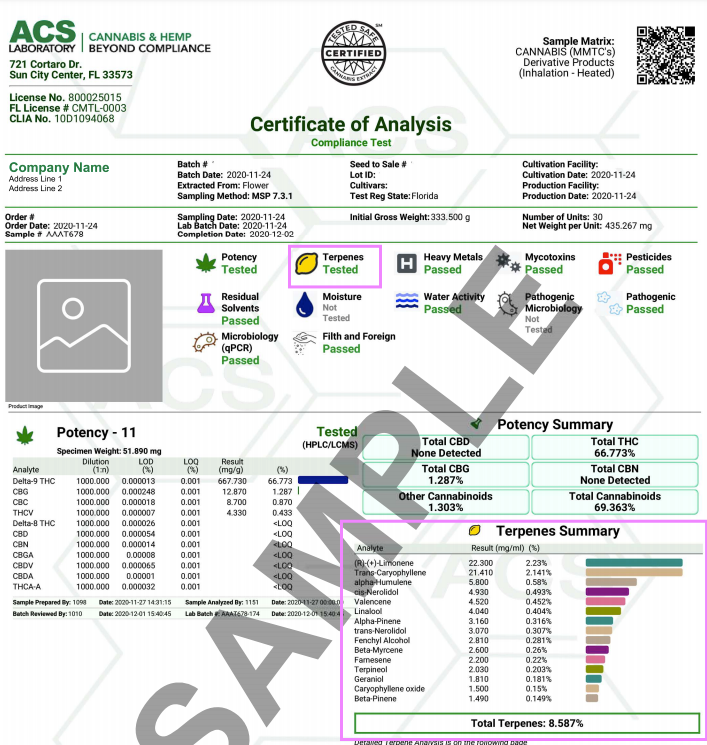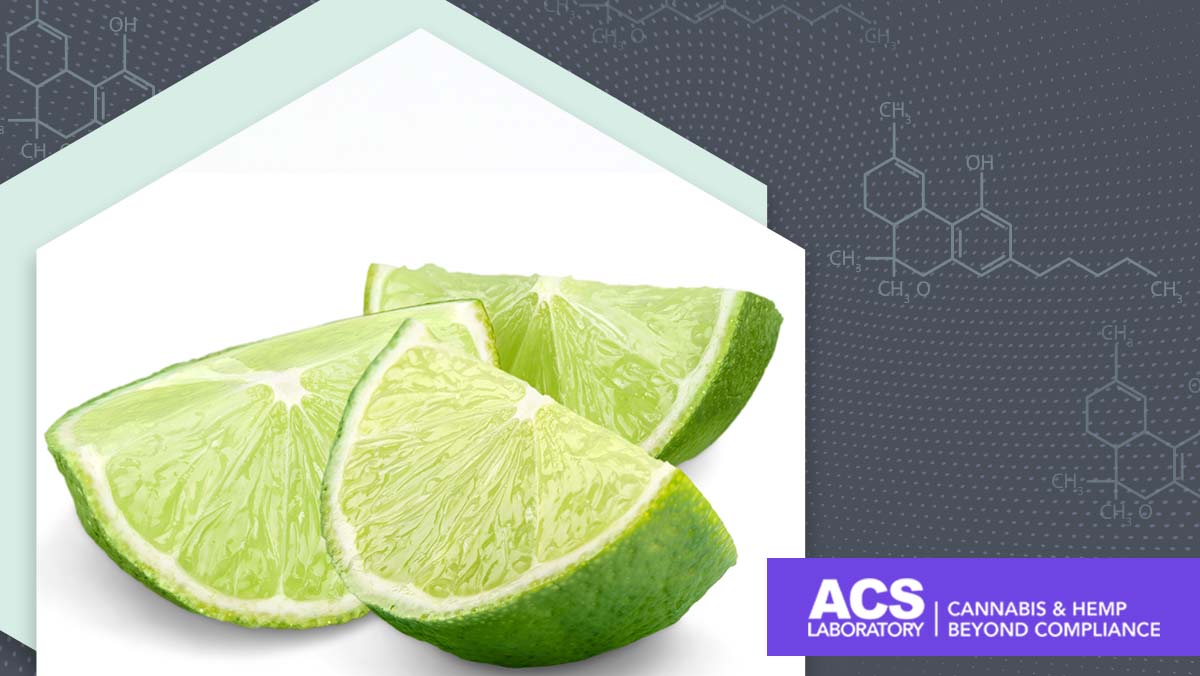Terpene Spotlight: Everything You Need to Know About Limonene Flavor, Fragrance, and Benefits

Do you know what's behind the uplifting or ultra-relaxing sensations of your favorite cannabis strains?
Hint–it’s not THC!
Terpenes are naturally occurring cannabis compounds that give each strain its unique physiological and therapeutic profile. These aromatic oils also offer your favorite cannabis varieties their distinctive flavors like pine, mint, berry, and citrus.
One of the most common terpenes is limonene, recognizable for its zesty citrus fragrance and energizing effects. Limonene is a core ingredient in lemons, grapefruit, orange, and lime. It’s also one of the most abundant cannabis terpenes and is famous for its variety of potential therapeutic benefits.
Here's a rundown of everything you need to know about limonene, its wellness benefits, and how it contributes to your favorite strains' various characteristics.
What Do Terpenes Like Limonene Do?
Terpenes occur in plants to help protect them from predators and harsh environmental conditions like extreme weather.
Each cannabis strain has a unique terpene profile that not only protect the plant, but contribute to the sensory experience. Cannabis terpenes work in synergy with cannabinoids like THC and CBD to produce the effects people experience when they smoke or ingest the plant. Terpenes help explain why two different strains with the same amount of THC can deliver such a distinct therapeutic and outcome profiles.
Evidence shows that terpenes provide direct physiological effects on the body, especially terpenes like limonene and linalool. For example, linalool-rich strains are known for their calming effects, and studies have shown that linalool is highly effective at calming elevated stress levels and promoting deep relaxation. On the other end of the spectrum, limonene-rich strains act as natural mood-boosters and energizers, which are thought to enhance the antidepressant effects of THC and CBD.

Limonene and the Entourage Effect
The term "entourage effect" describes how different cannabis compounds like cannabinoids and terpenes work together to create unique effects. The "entourage" of various cannabis chemicals provides compounded benefits you won't find from THC or CBD alone. Moreover, specific ratios of terpenes have the potential to enhance THC and CBD’s effects more than isolated terpenes.
So why isolate THC or CBD when cannabis naturally delivers a plethora of beneficial compounds? Limonene, for example, adds a citrus aroma and anecdotally enhances cannabis’ mood-elevating effects. It also works with several neurotransmitter systems in the body, including the serotonin and GABA systems, to contribute to alertness, mood, and thinking.
Limonene Research
- A review published in Chemico-Biological Interactions looked at numerous studies on the therapeutic effects of limonene. The paper concluded that limonene acts as an antioxidant, anti-inflammatory, antidiabetic, and anticancer agent.
- Limonene may have the power to protect the body from various disorders by modulating how specific immune cells behave.
- Studies conducted by the University of Arizona found that limonene can boost the immune system and play a role in managing the spread of some cancers.
- Not only is limonene healthy to consume when it exists in foods, but it also appears to be safe to take as a supplement.
- One of Limonene’s most significant strengths is its ability to help facilitate the absorption of various terpenes through the skin, gut, and mucous membranes.
Do Terpenes Like Limonene Get You High?
Did you know that THC potency alone is not an indicator of how psychoactive the strain is?
Terpenes help boost THC’s euphoric effects, but they are not psychoactive compounds on their own. While terpenes won't get you high, they do contribute to the way you might feel when ingesting THC or CBD.
Studies have examined the relationship between different cannabis terpenes and cannabinoids, and the results show beneficial co-dependent effects. One of the most significant combined effects is that terpenes, like limonene, can help decrease THC-related anxiety spikes in full-spectrum products.
Sources of Limonene in Your Diet
- Limonene is one of the most common terpenes found in nature and exists in citrus fruits like lemons, limes, and oranges. In fact, it is most abundant in orange peels and comprises around 97% of the rind's essential oils.
- You can find this lemony-flavored compound as an additive in various popular foods and drinks, including sodas, candies, and desserts.
- Unsurprisingly, limonene is also a popular ingredient in cleaning supplies and cosmetics.
- Because of its strong aroma, limonene makes an excellent botanical insecticide that you can find in pesticide products like eco-friendly insect repellents.
- Due to its antioxidant, anti-inflammatory, and mood-boosting powers, limonene is available in concentrated dietary supplements in liquid and capsule form.
- Finally, this citrusy compound is one of the most popular ingredients in essential oils due to its uplifting and therapeutic properties.
What Cannabis Strains Have the Most Limonene?
While you can find limonene in many strains, it tends to appear more frequently in Sativas. You'll also find it in many hybrid strains and certain indica varieties with limonene. Here are a few of the most popular limonene dominant strains on the market today:
Lemon OG
An intense, fruity flavor and an average of about 20% THC content make Lemon OG a tremendous strain for those who want to experience the benefits of limonene to reduce anxiety and stress.
Wedding Cake
At approximately 22% THC, along with the citrus limonene aroma, Wedding Cake is one of the most popular cannabis strains. It's famous for its delicious flavor and its calming effects.
Cinex
Cinex is a cross between Cinderella 99 and Vortex. With its intense citrus smell, it is a great strain to help boost your mood. Depending on the cultivation methods THC potency for this strain can range between 15% and 25%.
Giesel
A strain known for its limonene-derived citrus punch, Gisele is a cross between Mass Super Skunk and Chemdog. At approximately 15% THC, Gisele produces a high that induces both cerebral and physical relaxation.
Durban Poison
Considered a “pure sativa,” from South Africa, Durban Poison is known for its sweet aroma as well as its stimulating properties. This popular limonene strain is perfect for the daytime warriors who seek to spark creativity and curiosity–whether on a hike or painting indoors. Durban Poison has THC levels that can sometimes reach 24%, making it one of the world's more powerful strains.
Jack Herer
Jack Herer is a common hybrid that limonene lovers flock to for its ability to increase focus, joy, and creativity. While there are several Jack Herer variations, most are approximately 55% sativa dominant. it is generally agreed that Jack Herer strains feature a THC content of around 18-24%
Reported Limonene Benefits
Stress Reduction
Clinical studies have found that both inhaled and orally consumed limonene vapor can reduce anxiety in lab mice. It's also been shown to reduce obsessive-compulsive disorder behavior in animal studies.
Anti-Inflammatory
While inflammation is the body's natural response to stress, chronic inflammation is harmful and the cause of many illnesses. Some studies show that limonene can reduce inflammation.
Antioxidant
Limonene has been shown to possess potent antioxidant activity and protect cells from oxidative stress.
Cholesterol Reduction
Limonene may help reduce triglycerides, increase "good" cholesterol, and lower blood sugar levels.
Appetite and Weight Loss
There is evidence that limonene can help promote weight loss by lowering blood sugar and the lipids associated with metabolic syndrome.
The Bottom Line
As one of the most common terpenes found in cannabis, limonene is famous for its aromatic and flavorful citrus profile and its ability to act as a potent therapeutic agent. But not every strain contains perceptual levels of this uplifting compound.
So, how can you check which varieties have the most potent limonene concentration? Three letters–C.O.A. Remember, all products should include a Certificate of Analysis (COA) from a verified testing laboratory that lists cannabinoid content and safety information.
But COAs from innovative, transparent brands will go a step further to include terpene content. If you are interested in seeking limonene or learning the terpene profile of a particular strain, ask your budtender if they carry products with lab-tested terpene profiles.
Sample COA with Terpene Profile




.jpg)






.png)
.png)
.png)
.png)
.png)